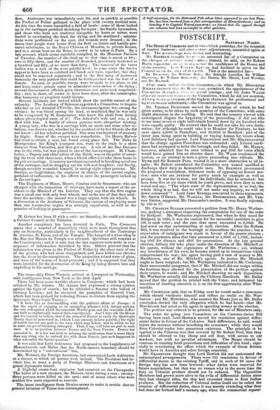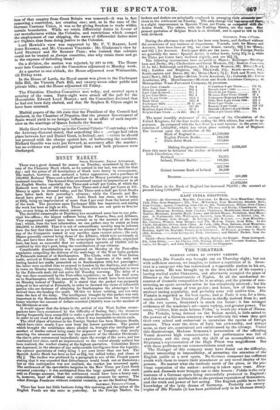POSTSCRIPT.
SATURDAY NIGHT.
The House of Commons met at two o'clock yesterday, for the despatch of routine business : and after a t.lun t adjournment, assembled again at four. The pi cleeecings new wiled and interesting.
Mr. ROEBUCK Nought lo w• • d au amended list of a Committee on the charges ot (4,2 nip. mist.; framed, he mid, on Sir Robert Peel's suggestim to coo-111foot the confidence of the House and
of the comm.). Lord Frac,cie Eger:on had declined to serve on the Commit re on the .1..0re of ill I eAlth. This is the amended list— Mr. Br,dnvion, Mr. William huile, Mr. Sebright Lascelles, Sir William Heat unit., Sir 11 alum Sonic. val., Mr. Hawes, Mr. Strutt, Lord Worsley,
am! Mr. buck.
A er sonic raaer ea. dom discussion,—in which Mr. MONCKTON MILNEs declared H..uee had permitted the appointment of the Committee :It ooch av 01 moral courage ; and Sir JOHN WALSH
objected to eel ;,iii nand s on die Committee, which he did not mention,. wi-hirtg to see p ntiemen of the highest character for professional and legal eminence substituted,—the Committee was agreed to.
Mr. THOMAS BUNCOMBE moved the declaration of which he had given notice, to be taken by each member of the Committee, with some slight alteration in the wording. He said that the country viewed with unmitigated disgust the hypocrisy of the proceeding : it did not like to see some seven or eight individuals hunted down by six hundred who were equally guilty. He avowed that he could not take his own decla- ration; for although he could take it as Member for Finsbury, he had once spent 4,000/. in Pontefract, and 30,0001. in Hertford; part of the latter sum being spent in building or buying houses for voters whom Lord Salisbury had ejected. Lord POLLINGTON and Mr. MII.NES averred that the charge against Pontefract was unfounded: only Liberal candi- dates had attempted to bribe the borough, and they failed. Mr. HARDY, however, admitted that he once refused to pay 5001. for votes which would have gained him an election there. Mr. WARD condemned the motion, as an attempt to turn a grave proceeding into ridicule. Mr. HUME and Sir ROBERT PEEL treated it as a mere obstruction to all in- quiry: Sir Robert considered the Committee now named qualified to discharge their duty as honourable men. Mr. ROEBUCK pronounced the proposal a roundabout, dishonest mode of opposing an honest mo- tion: men who are :anxious for purity teach by example as well as precept. It was the system, not the individuals, that he attacked: but here were five or six cases which he could prove, and were they to tarn round and say, "The whole state of the representation is so foul, the whole thing is so bad, that we will not make any inquiry, we will -sit down contented" ? Lord Joint RUSSELL concurred in these arguments. Mr. SMITH O'BRIEN, Mr. WAKLEY, Mr. BROTHEBTON, and Mr. VER- NON Sttrrn, supported Mr. Duncombe's motion. It was finally rejected, by 160 to 17.
Mr. CHARLES BULLER presented a petition from Mr. Henry Warbur- ton, making a statement respecting the compromise for one of the seats for Bridport. Mr. Warburton represented, that when be first stood for Bridport, in 1826, it was the custom for the successful candidate to give 101. to each voter ; and the sum thus spent amounted to 2,000/. He had acted on that understanding at each election. After the Reform Bill, it was resolved in the borough to discontinue the practice; but a reservation of indulgence was made in favour of the poorer electors ; and the payments since that time amounted to 1,500/. or 1,7001., includ- ing 100/. for dinners and 4901. for processions. At the last general election, bribery did take place under the direction of Mr. Mitchell or his agents, without the cognizance of Mr. Warburton ; yet, without any interference of his own, he became mixed up in transactions which compromised his seat ; his agent having paid a sum of money to Mr. Hutchinson, one of Mr. Mitchell's agents. In justice Mr. Mitchell ought to have resigned; but Mr. Warburton intimated to Mr. Cochrane, their unsuccessful antagonist, that if Mr. Mitchell did not resign within the fourteen days allowed for the presentation of the petition against their return, he would ; and Mr. Mitchell showing no such disposition, Mr. Warburton actually did accept the Chiltern Hundreds. Mr. Buller moved that the petition be printed with the Votes ; and intimated his intention of drawing attention to it on the first opportunity after Whit- suntide.
Mr. COCHRANE said, that on Friday next he would make a statement which should vindicate himself and reflect no credit on Mr. War- burton: and Mr. Mrrcnam., who entered the House just as Mr. Buller concluded, denied the only allegation which he had heard—that Mr. Hutchinson had acted as his agent in spending money at the election. The petition was ordered to be printed, for the use of Members only..
The order for going into Committee on the Customs-duties Bill having been read, Lord HOWICK moved his resolution against differ- ential duties in favour of the Colonies. Such differences, he said, would injure the revenue without benefiting the consumer ; while they would force Colonial trades into precarious existence. The principle to be applied to the Colonies was that avowed by Sir Robert Peel, that they should be allowed to buy cheap and sell dear, with access to our markets, but with no peculiar advantages. The House should be cautious in creating fresh protections and difficulties of this kind ; espe- cially in considering the effect which the example of Great Britain would have in America and other foreign countries.
Mr. GLADSTONE thought that Lord Howick did not understand the contemplated arrangements. There were 131 remissions in favour of differential duties in the existing Tariff, and in each of 98 cases the foreign duty has now been lowered: other duties were reserved for future negotiations, but that was no reason why in the mean time the duty on Colonial produce should not be reduced. The Opposition Members had grown more alive to the evils of differential duties since they had changed sides, for they had extended them to East Indian products. But the reduction of Colonial duties Could not be called the creation of differential duties, since it was merely extending what they had done for Ireland half a century ago, when the commercial sepses-
tion of that country from Great Britain was removed—it was in fact removing a restriction, not creating one ; and, as in the case of the German Customs Union it was so far giving freedom to trade within certain boundaries. While we retain differential duties in favour of our manufactures within the Colonies, and restrictions which compel the employment of our shipping, the name of differential duties must not frighten thus from doing Justice to the Colonies.
Lord Howick's view was supported by Mr. F. T. BARING, Lord JOHN RUSSELL, and Mr. CHARLES VILLIERS • Mr. Gladstone's view by Lord STANLEY and Sir ROBERT PEEL; who insisted that colonies could not be treated as foreign countries, else why retain them and go to the expense of defending them?
On a division, the motion was rejected, by 281 to 108. The House went into Committee; and the Committee adjourned to Monday week.
At a quarter to one o'clock, the House adjourned over Whitsuntide, till Friday next.
In the House of Lords, the Royal assent was given to the Exchequer Bills Bill, the Victoria Park Bill, and twenty-seven other public and private bills; and the House adjourned till Friday.



























 Previous page
Previous page